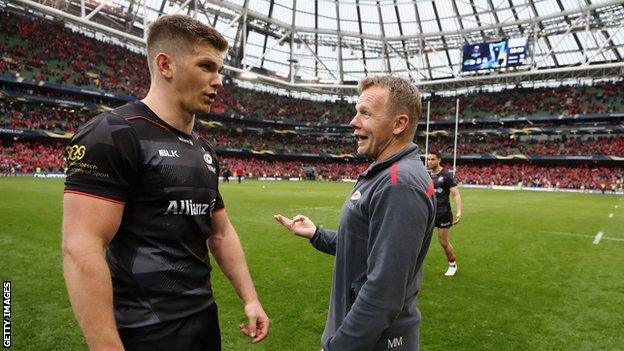Mark McCall: Saracens director of rugby calls for change to salary cap
- Published

Saracens are the reigning back-to-back European champions
Saracens director of rugby Mark McCall has called on Premiership Rugby to amend their salary cap to help English clubs retain their home-grown players.
McCall says Sarries will find it "very difficult" to hand their England players competitive new contracts with the current cap of £7m per year.
And he wants a section of the wages to remain exempt for academy graduates who stay loyal to their clubs.
"For now the cap is staying level which makes things difficult," said McCall.
"I think there should be an incentive for clubs to grow their own and to bring English players through for English clubs and for England."
Saracens, who are reigning back-to-back European champions, saw five of their English players tour New Zealand with the British and Irish Lions this summer - and all were academy graduates.
Mako Vunipola, Jamie George, George Kruis, Maro Itoje and Owen Farrell all featured prominently as the Lions drew the Test series.
"It would be an unbelievable shame if we had to lose players we have grown ourselves, who have come through our system since they were 14 or 15," added McCall.
"If you bring a player through your academy system and he becomes like some of our players, then there should be a limit on what he costs you in the salary cap."
The Premiership Rugby salary cap rose to maximum of £7m for the 2017-18 season, a figure that includes a maximum of £600,000 which clubs will receive if the teams hit the Premiership's existing home-grown player quota.
The bulk of Saracens' England and Lions contingent are contracted until 2019, and are on course to ask for sizeable wage increases when they negotiate their next contracts.
"To be penalised for having all these academy players who are only asking for their market value, and not to be able to afford them and to have to let them go, doesn't seem right," added McCall.
Get all the latest rugby union news by adding notifications in the BBC Sport app.
- Published22 August 2017

- Published8 September 2016

- Published27 July 2016
